Visioning Being The Change

Like many activists, I've often struggled with the balance of working within the current system, supporting alternatives to it, and creating changes in my own life. This imbalance can be hard to sit with. It brings up a variety of questions about effectiveness, morals, and pragmatism. I have found XR Being The Change encouraging as they invite us to a bigger and more beautiful path outside of this individual turmoil. Their vision opens up a variety of viewpoints, or pluriversal thinking, that help to find balance and picture the more beautiful world it will lead us to. For those that can't watch a longer video or, like me, simply prefer the written word, I've created a summary and approximate transcript of their Visioning Session. These notes are to help dive into the key ideas involved and enable wider sharing and discussion. Enjoy!
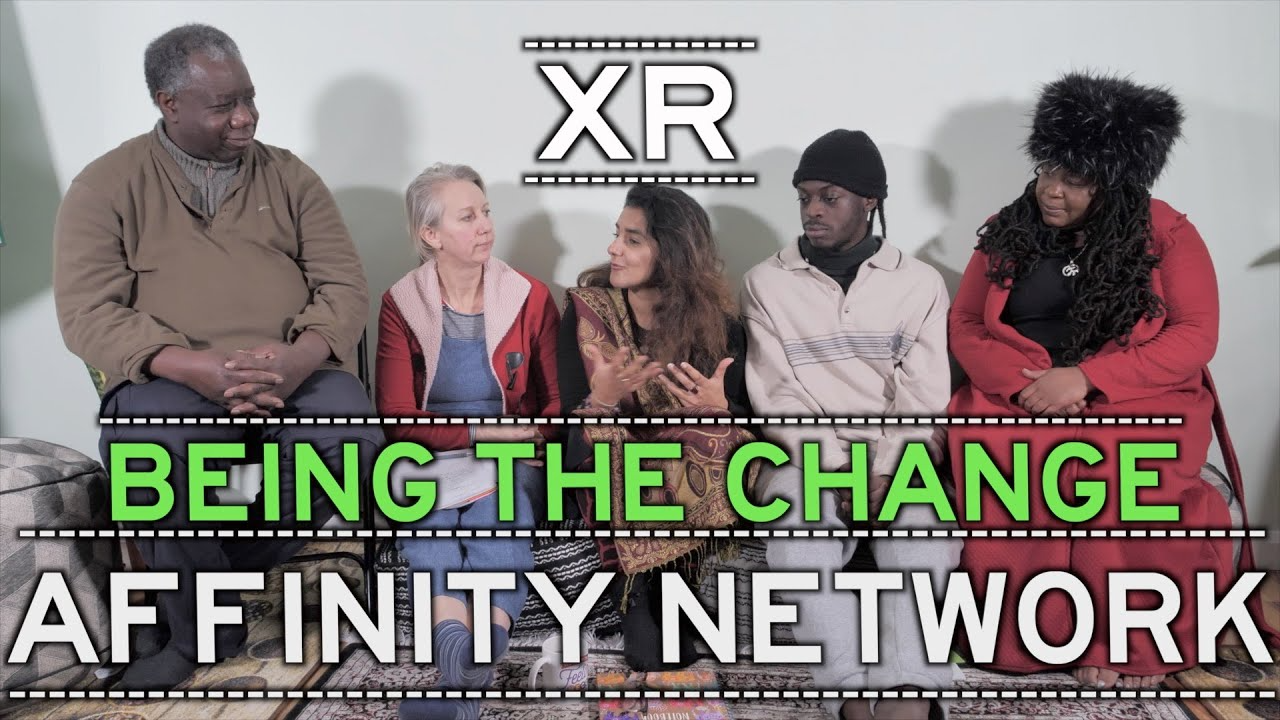
Introductory sharing with Kofi Mawuli Klu, Gail Bradbrook, Skeena Rathor, Kobina Jerry Amokwandoh, and Esther Stanford-Xosei. Together they share their overview of context and visions for a new pathway for Extinction Rebellion along with other communities and groups working for the more beautiful world our hearts know is possible.
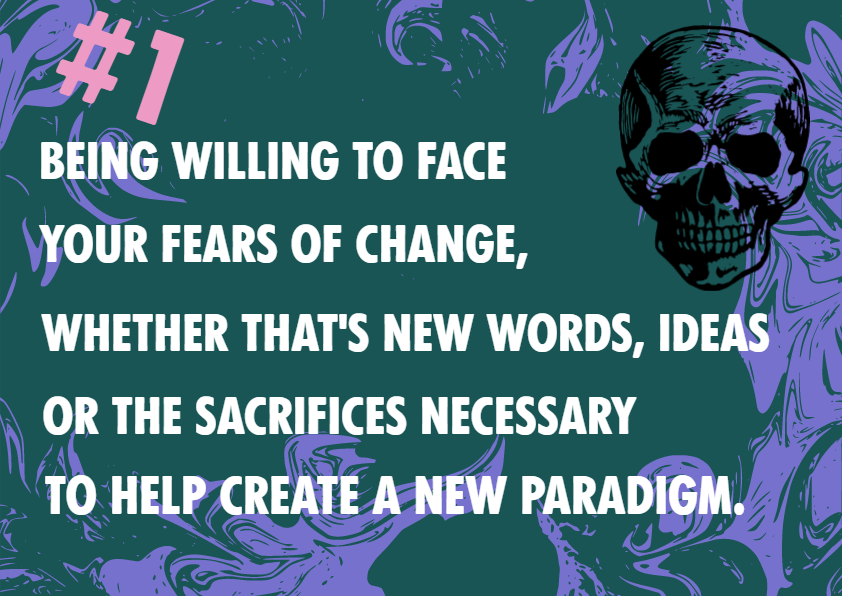
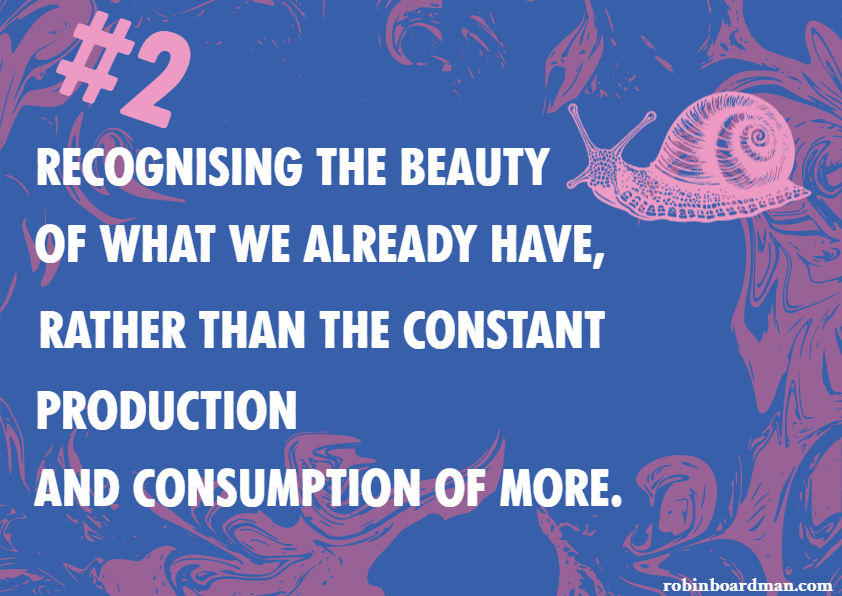
Transcript
What does Being The Change mean to you?
Jerry: If we’re not trying to work out who we are becoming; if we are not working with existing groups who are focused on those solutions, then we are wasting our time. For me, it’s like Salvador Allende says, “To be young and not be a revolutionary is a contradiction”.
Gail: We haven't worked out how to do all the XR Principles & Values like openly challenging ourselves and this system. We have a disease in our system and ourselves. It's this paradigm of domination. We need to create roots of connection and of being a global family. You don’t need power’s permission for that. What we need is an open space for gatherings and stories of resistance.
Esther: Being the change is about returning to the ways of our mother earth. Learning how to connect to her through community and land. This disease in society is creating separation. To heal it we must connect to the land and focus on planet repairs. The disease impacts all of us in different ways. Reparation means stopping harm and then working on repairing our relationships with the world. We recognised from the beginning that there was a lack of this in XR. We are at a time when we can't keep relying on other people's power to liberate us. We must do that ourselves. Our culture must derive from the earth and our connection to it. There are many examples of ways of life that are about connecting with and working with our planet, particularly in the global south.
Kofi: The practicalities of the vision mean that we need to repair the harm of coloniality. We need to imagine the world beyond that. Indigenous activists have long pointed to a world of not harming each other. This is what humanity can truly lead to. Extinction Rebellion has been a meeting point for thinking beyond harm and into a beautiful future for many generations. Being the change means primarily being the change to stop the harm. That means stopping harm to ourselves, others, including other lifeforms, and this planet. This will stop us from running off the cliff. We can align our coliberation movement around stopping that harm. When we can heal ourselves then we have huge potential to help heal and protect our planet. In other words, it's Bob Marley’s concept of One Love! It's mind-boggling that we have so much harm and knowledge of how to address it and yet we can’t see the love and protection needed for the world. It starts with a recognition that the life of one is the life of all of us.
Esther: As Cornel West said, Justice, is what love looks like in public.
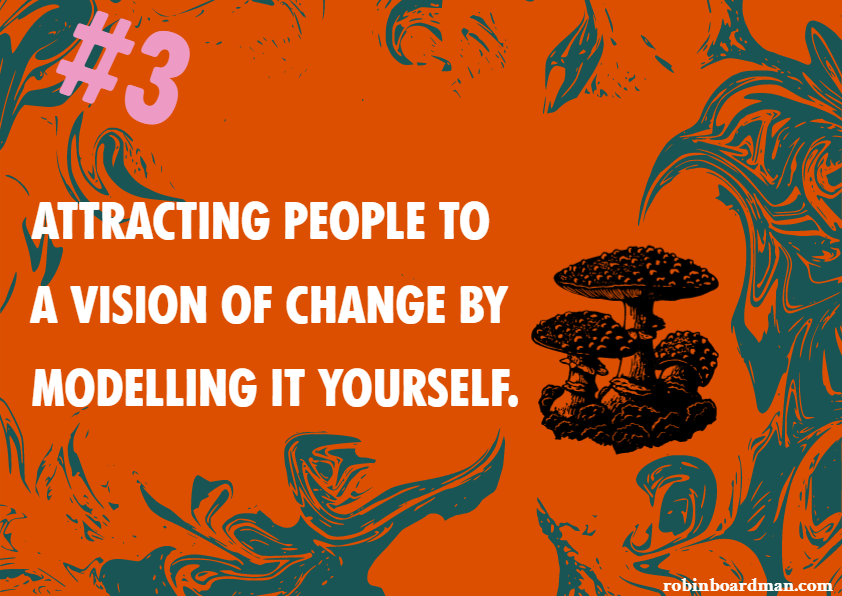
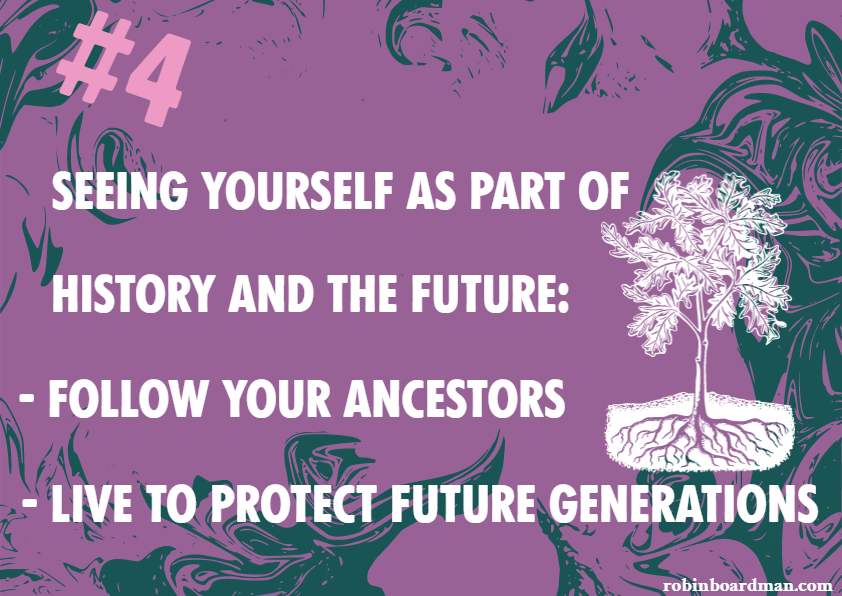
Skeena: Or as Martin Luther King said - Justice is correcting everything that stands in the way of love. That means fierce love that can protect, care and regenerate.
Now many of us are working on a re-storying. Telling a new story to one of our dominant cultures. Our dominant culture has a big story that is based on hero stories, it relies on an imagined salvation from somewhere else. But what if it's us? We need a new story and a new language to go along with it. That’s what is needed but it can be very challenging. When we discuss pluriversality and coliberation people are unsure what they mean.
Kofi: Well, some are hearing them for the first time and need close dialogue and collaborative learning from each other around the depth of what they mean. Then some people say “I don’t know what you mean”, despite having heard them repeatedly, who use “I don't get it” as a way of saying “I don't want to get it because it challenges my knowledge of privilege and supremacy”.
I was born in Ghana, a country that was a British colony where they imposed culture and knowledge on us through violence. They essentially said that my culture meant nothing - all the violence around me was also happening in the destruction of our knowledge systems. They killed our ideas and culture. All your culture had to come from Europe, a place you have never seen. They destroy our indigenous personality. Now we turn around and start to introduce these knowledge systems to stop the destructive mindsets of colonisation in this country. We do it in English and we are very open to explaining them. And yet then people claim not to understand. After all the violence we have experienced through colonialism, you’d think that the least people could do in colonising countries is to listen and understand the benefits of our indigenous knowledge. We must call out people who are deliberately dodging it out of arrogance.
Esther: The book A Course in Miracles struck me - it says there are only really two emotions, love and fear. That arrogance comes from a place of fear. Fear of change. So we must be able to see the whole, loving vision to help to create a place where people are ready for change.
Kofi: This country has focused on treating people as subhumans for hundreds of years and indeed, creating a climate emergency. There have always been people who have challenged that. The movement for anti-enslavement started from below and rose against the system. It then found allies in power who helped to bring about that change. Why can’t we look into our own history of resistance and rise above the fear? They didn't need to beg power for power. The real story of this country is its history of resistance. That is our power. It’s time to wake up and have the courage to overcome the fear.
Jerry: That is why motherism is important because that unconditional love will be painful. In the same way that loving a child isn’t always easy, we must be ready to face the challenges that stand in front of a more loving path to a new paradigm. The violence of this country is that we are denied the truth of our own history. We must therefore connect with the resistance around us as part of us to be the change. This is why we’re passionate because these are our families.
Kofi: It's important to say this is not about charity either. It's not about saving anyone. It's about saving yourself. The vast majority of people across the world are in rebellion in many different ways. If we can connect those modes of resistance then we can create a unifying people's power that can set us all free. If we can do that then we can really change things.
Gail: We have an individualistic culture that actively draws us away from that. It says to go to therapy to sort yourself out rather than be in community. It teaches a history that only values the British battles won and not the horrors of witch-hunting, for example. We are often too comforted which is actually an aversion to really seeing our humanity. It's going to hurt to stop living in that way but we need it. We need to come together across how we have been racialised, with faith groups, etc, to be with each other for that healing. What a liberation it will be! It will be fun!
Skeena: What you're talking about is the co in coliberation. The most frightening thing for any living being is to be alone. We are in a deep fear of our aloneness. This presents us with the how of social change - we need to create a reconnection, with each other and the great mother earth. To recognise ourselves as part of a universe that is alive. The so-called white and western culture avoids it. We can create that change.
Kofi: If we can connect with the people who know the only way to change is with themselves, which is the majority of people in oppression, then we can empower each other rather than being the white savior. From there we can connect with their hearts and spirits of resistance. Being the change is daring to see the human being in other human beings. To dare to experience real life. The life that will emancipate you is the life of our earth.
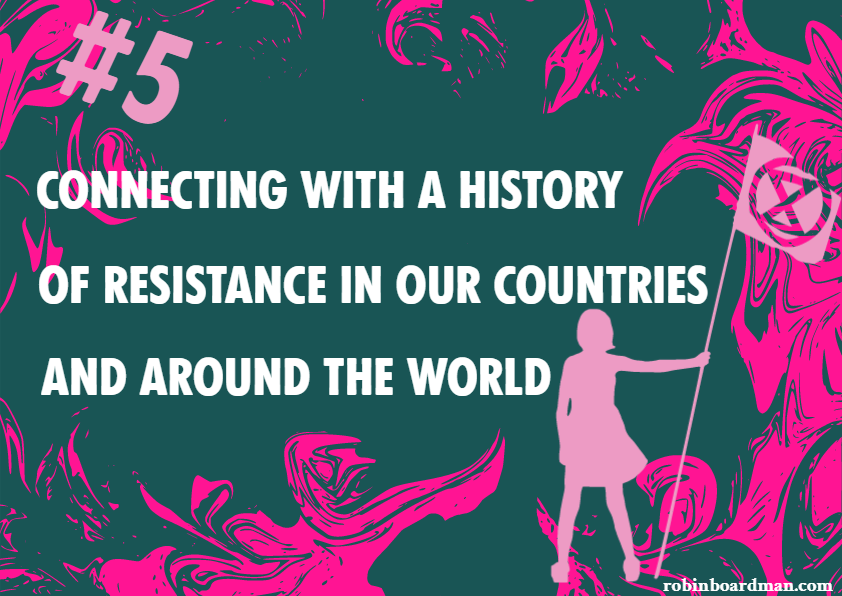
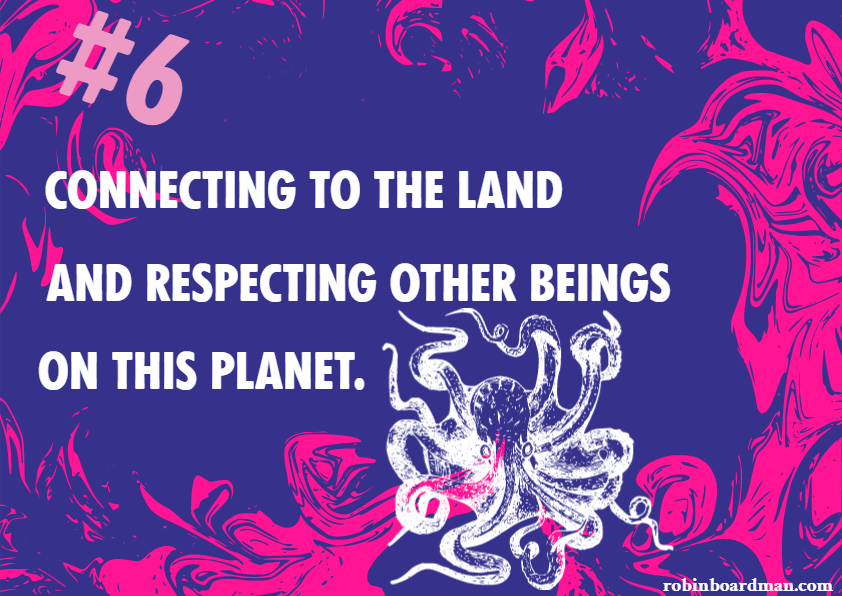
Skeena: This gives us a chance to reimagine how we want to work with each other. We create systemic agreements. We want to connect back to the land, not be included in the dominant culture. Inclusivity is a word that gets used a lot now and I think we should name the subtle but important flaw in that word. Being included means having your voice heard in a dominant culture that claims it will protect the planet. Whereas being the change means connecting back to our ancestors' earth-protecting practices and finding our voices, not the ones that nicely fit into what already exists.
Esther: This means we need to sacrifice. The easy path is to fit in but the true and difficult path is to be the change. We have become accustomed to toxic habits of communicating and relating. They don't bring out our deep joy. We need to be able to let go of those. Then we need to look at the barriers to being the change - both in XR and in our society. What are our barriers? My perception is that a lot of that sacrifice is that people who are racialized as white need to go against the grain of what they are told they are and what they should be in this culture. Someone like Gail might even be seen as a race traitor for defying white culture and that will be difficult. But its importance is that it calls on others racialized as white to do the same. There will be fear and resistance but it is starting to sacrifice that will help make the change.
Gail: It's been a difficult few months with the UN Climate Change Conference’s failure and organisational issues. We need to be trying different things. I think we need to be visionary. People of colours and cultures are at the heart of that vision. I have faced a recent betrayal and hurt around these ideas. They are being marginalised in XR. I don’t think it's about putting up walls to those people but finding the people you want to work with who are creating vision and attracting people rather than just pushing people into action. What we need as the attraction force is love - that means having times when we feel challenged and holding onto each other through that. Young people are leading some of this, such as RYSE. They are saying that it's okay to not know. They are spending time on difficult topics like changing the schooling system. People keep telling me to keep it simple but this stuff isn't simple, we need to learn along the way and be curious.
Kofi: We need to learn to trust in mother earth. The greatest pathology of whiteness has been to dominate mother earth because you just want to keep extracting. Gluttony. Sadism. Indigenous culture isn't about wearing fewer clothes and holding spears, as one journalist once claimed to me. It's about creating respect for other beings and people on this planet. We just need the beauty of ourselves, not more consumption. We need to learn together by going out into global communities of resistance, who know the value of land and life around them so that we will all have a better appreciation of what life is.
Robert Wedderburn and William Davidson, abolitionists in England hundreds of years ago, debated on industrialisation and insisted that people must be connected to their land. This is the untold story of chattel slavery and its resistance in Britain. That it also included going beyond just enslavement and pushing for land connection.
Whiteness has been a violent imposition on Europeans as well as the rest of the world. We all need to unite against it. This isn’t an Insulate Britain style project - too focused on one area - it's about global connection to a deeper knowledge of what it means to live.
Skeena: We need to ask our young people what it is that they need. They are closer to knowing. We can learn a theory of change that takes useful info from social movement theories like Paul Engler’s work but we must also stretch the horizons further.
Kofi: We are capable of so much more than this! And that is what widening our horizons can do. Do the impossible! We are in a beautiful, amazing moment to learn this and dare to venture into the future. We are communities of the past, the present, and the future. If you can overcome the fear of death, just as part of living, then you are really with life. You recognise that we all create footprints in the sands of time and think about how future and past generations will look at those footprints. We must Be The Change not just for the moment but for all time!
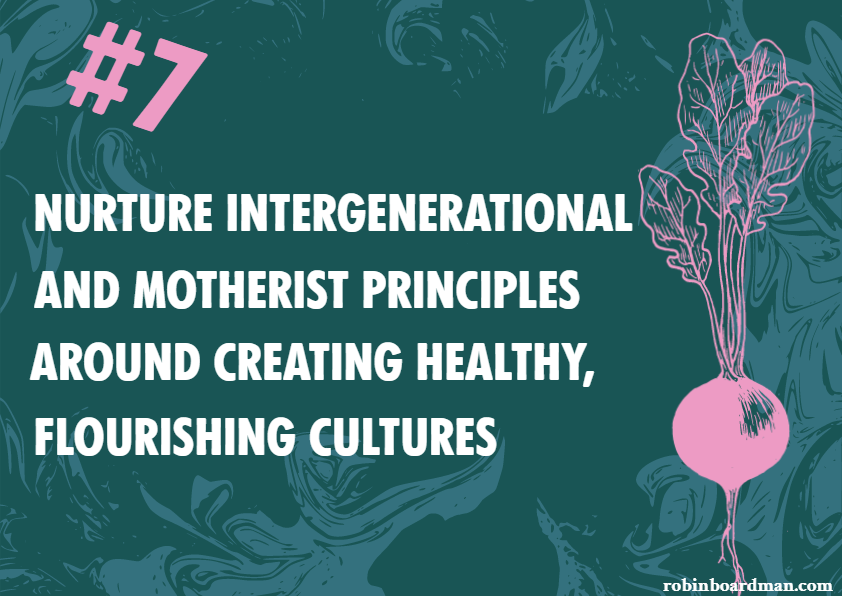
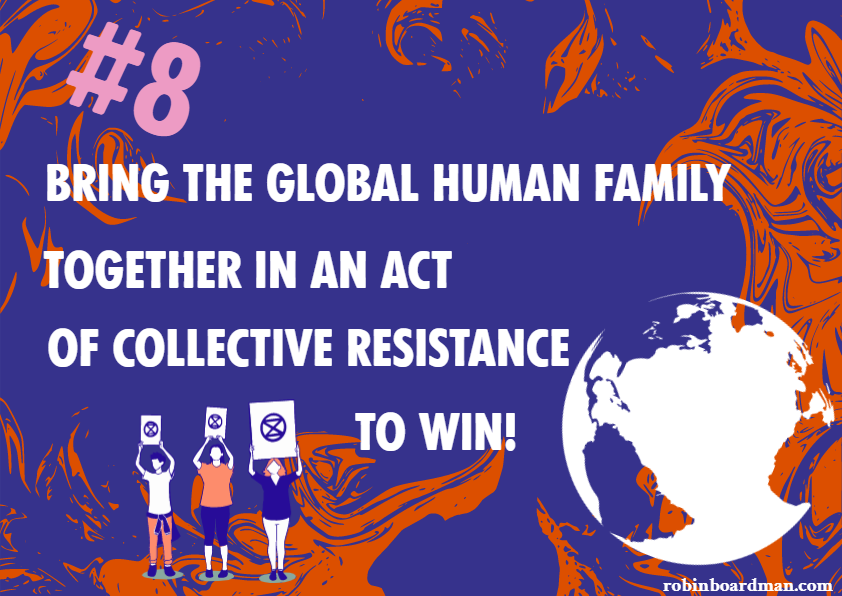
Skeena: How do we do this by going backward and connecting the planet?
Jerry: Our generation is looking at the challenges and sacrifices and we believe that to confront them we must learn from the majority of the world's people. It's the only language that does justice to the work of our ancestors toward liberation. We need to keep up those attritional gains. We can’t let young people fail to engage in ancestral work and struggles. Some of us are facing it head-on. We were in court to challenge the Government on its mass genocide of young people and we listened to them tell us that the young lives of today are going to be killed. They will not protect the young generation. This makes the truth so clear and our unifying force stronger because we can face the unclouded reality. We know history will forgive us.
Skeena: That expresses to me exactly what co-liberation is about, unifying based on the truth of circumstance and flourishing together based on that shared knowledge.
Esther: We are talking in a visionary way and much of humanity is just on the treadmill of life, too busy making ends meet to see that vision. As a reparationist, I see this vision as a continuation of reparation works in so much as we must continue to work on our humanity. We have the vision of a repaired Africa. We want our own self-determination communities that work with the land. We are reconnecting with our homelands and their ways. This spreads beyond African people. We are all originally from Africa, including Europeans. We have concrete processes on the way such as the European Council on Reparation. We have a historic mission and a duty to work on the many worlds of global justice. From there we can challenge the climate and ecological crisis. This is what all the mothers in my line have taught me. We teach our young about our culture. We will never be able to do enough on our own. We must connect with previous generations.
Gail: Exactly - and we need to be wary of the false versions of that. White people in particular need to be wary of what the Entangled Activist talks about, which is that if you're an activist but you feel you are extracting from yourself to the point of burnout and exhaustion, or doing that to others, or ignoring the important relationships between people and just focusing on the material differences - then you are recreating the dominant paradigm. Let's make sure our resistance and our civil disobedience have the roots of connection in it.
Skeena: We are looking for that connection. We have made mistakes and there is a sorry there but there is also an invitation to come back together. To face our challenges together. To hold us in our mistakes. There is nothing in life without coming together as our one human family.
For more resources from Being The Change, check out their Seedpod, a brilliant, diverse collection of thinking around Relate, Repair, Resist!
Disclosure: If you buy books linked on my site, I may earn a commission for book money from Bookshop.org, whose fees support independent bookshops 📚☕
Telegram broadcast of updates: https://t.me/+LTcMg_C3XVUzMGY0
Digital solidarity channel https://t.me/+jlEkvbCpsKplMWI0